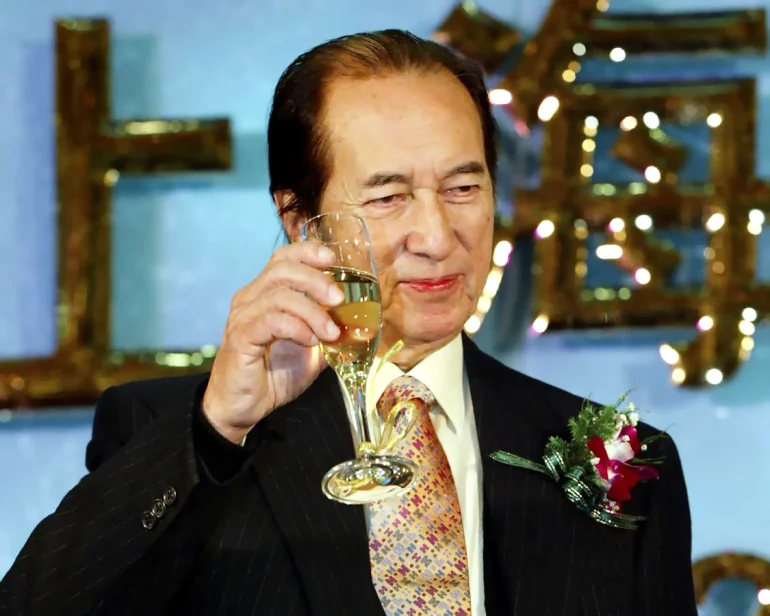Stanley Ho Hung Sun, a renowned figure in the world of gambling in Hong Kong and Macau, became a legendary figure during his lifetime. Even now, when he is over ninety, he attracts the attention of journalists and the public. For forty years, this man held the reins of Macau's gambling industry, possessing a government monopoly on this type of activity, which allowed him to amass a vast fortune.

Stanley Ho has a fortune of several billion dollars and is the richest resident of Macau, as well as one of the wealthiest people in Asia. His areas of interest include not only gambling but also tourism, entertainment, real estate, banking, air transport, and the merchant navy, among others.
Throughout his eventful life, he was repeatedly attributed to the Asian mafia. However, Stanley not only evaded similar charges but also managed to earn a reputation as a respected member of society, and the government regularly awards him titles and medals.
The importance of Stanley Ho to Macau lies in his employment of approximately a quarter of the local population, and his businesses account for up to thirty percent of the revenue. One of his statements, even if not directly related to the business, can lead to significant fluctuations in the financial market. Not surprisingly, the local authorities are so kind to him.
Early Biography of Stanley Ho
The future billionaire was born in Hong Kong in 1921. He is the ninth of thirteen children in the influential Ho family. But he didn't have a cloudless destiny as a child of wealthy parents. When Stanley was in college (where he wasn't brilliant), his father went bankrupt. This was followed by a series of family tragedies: the suicide of a brother, the father left them, and so on.
Ho, who stayed with his mother and two sisters, realized that there was no one to rely on for help. He hit the books and got a scholarship that allowed him to study at the University of Hong Kong. However, World War II prevented Stanley from pursuing higher education.
Ho began working as a clerk in a Japanese company engaged in the import and export of various commodities. Even then, he began to exhibit the qualities of an actual shark in business, and he possessed an excellent knowledge of four languages. At the age of twenty-two, Stanley Ho became a partner in the company.
But do not think that Stanley's career path was crystal clear. They say that initially he got rich by smuggling, he took part in the war of Macau against China.
In 1943, he founded a fuel company and later started a construction business in Hong Kong, which has been highly successful in this field.
Stanley Ho and Gambling
By the early sixties, Stanley had a considerable fortune and was already involved in the gambling business as a co-owner of several casinos in the Philippines. But the political game forced him to withdraw from the market in this country.
Furthermore, teaming up with several millionaires from Hong Kong and Macau, Ho won a public tender that entitled only their company to open a casino in Macau. At the same time, he got around the mighty clan of Fu, which owned the majority of gambling establishments in the region.
Further progress on the Empire of Stanley Ho in the gambling market can be easily explained. Lack of competition, ample capital, and impressive business experience enabled him to establish a chain of luxury casinos, the finest in Lisboa. We'll discuss it in a separate article on Casinoz.
Ho later founded the Asian lottery SLOT and opened an online casino, DrHo888.com. Stanley also owns numerous bookmakers.
Modern History
In 2003, Stanley Ho faced new competitors in the Macau gaming industry. The government abolished the monopoly on this business, which included Sheldon Adelson and Steve Wynn. They built incredible casinos in Macau, overshadowing Stanley's casinos. Ho opened Casino Grand Lisboa, which is also very popular among players from Asian countries.
In 2009, Stanley almost died, barely surviving a heart attack, after which he was bedridden for about a year. He began transferring control of his businesses to family members. This process was connected with scandals, and Ho even made a statement that relatives are trying to take away his business. It is not surprising, considering that Stanley had seventeen children by four different women.
Whatever it was, even after that, Stanley Ho, who was over ninety years old, continued to hold essential positions in various companies and organizations.
Last Days of Stanley Ho
Stanley Ho's final years were marked by a significant decline in his health and a complex family dynamic surrounding his vast business empire. In July 2009, he suffered a fall at his home that necessitated brain surgery. This incident marked a turning point, as he spent seven months in the hospital and was rarely seen in public afterward, typically appearing in a wheelchair. This period also led to a significant shift in the control of his financial interests, as he began to devolve his grip on his empire to his various wives and children, culminating in a public family dispute over his assets in 2011, which was eventually settled.
Despite returning home in March 2010, his health continued to deteriorate. He was reportedly diagnosed with Parkinson's disease and also suffered kidney failure, which required long-term dialysis treatment. These ailments weakened him considerably, affecting his ability to speak clearly and swallow food, leading to repeated lung infections. He relied on tube feeding in his final years. His last known public appearance was in 2009, at the 10th anniversary celebrations of Macau's handover, where he met then-President Hu Jintao.
In the days leading up to his death, news of his worsening condition circulated, and doctors reportedly called his family to prepare them for the inevitable. Although he showed brief signs of improvement when visited by loved ones, his body became too weak to sustain further life-saving measures. Stanley Ho passed away peacefully on May 26, 2020, at the Hong Kong Sanatorium & Hospital, at the age of 98, due to organ dysfunction, geriatric disease, and viral infections. His three surviving wives and many of his children were by his bedside. His passing marked the end of an era for Macau and the Asian business world.














